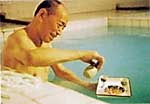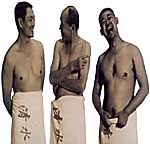|
In most conversations among Chinese filmmakers these days--whether in
Shanghai, Guangdong, Xi'an, or Beijing--the name "Luo Yi" tends to comes up
with disturbing frequency.
Here's an example (variations of which I've heard no less than five dozen
times in three different cities): "Yeah, man, the market's a mess, theaters
are mostly empty, and no one really knows what's going on or has any real
plan... except that guy, what's his name?--Luo Yi."
And the reason Luo Yi is such an oft-mentioned conversation topic is
because the 32 year-old American film producer and entrepreneur, alias
Peter Loehr, has disturbed the domestic movie market enough to become a
filmmaking "concept" unto himself. And that concept is most concretely
embodied in his three-year-old company, Imar Films, the first independent
film company in China and producer of the new film Shower.

The most impressive thing about Loehr is not his perfect, Beijing-dialect
Mandarin (to add to fluent Japanese), his prodigiously successful
background in the Asian media business, or his tireless commitment and
18-hour work days. Nor is it the fact that he's pounded thousands of miles
of film-distribution pavement and given unprecedented creative leeway to
more first-time film directors and screenwriters than most Chinese film
studios. And it's not his place on Variety's 1999 list of "Ten Producers to
Watch," or his office-a former medical clinic renovated into a hip,
comfortable steel-and-masonry work space which offers convenient access
from the second floor to the first by means of a big, shiny firepole.
No, the truly impressive thing about Peter Loehr is that in a film market
where no one-and I mean no one-seems to possess half a clue about what's
going on, he "gets it."
Imar Film's debut production, the 1998 sleeper hit Spicy Love Soup jerked
honest-to-goodness tears and laughter from hardworking, ticket-buying men,
women and children all over the country. Directed by music video auteur and
freshman movie director Zhang Yang, the five cross-generational vignettes
on love and marriage grossed over US$2.8 million on its bargain-basement
US$350,000 production budget, and planted Imar's flag on the Middle
Kingdom's celluloid map.

Spicy Love Soup's hot box office performance also confirmed that Imar's
creative power and movie marketing panache was already in a league far
beyond the meager production budgets the company had to play with.
Making wise use of its strategic partnership with Taiwan's Rock Records
(which contributed music to the film), Imar released Spicy Love Soup's
soundtrack a month before the movie's release. The soundtrack sold 500,000
copies and provided high-profile advance publicity for the movie. In
Shanghai, a Valentine's Day release and promotional tie-in with Cadbury
Chocolate helped sell 40,000 tickets on Spicy's first day. As a result, the
film's domestic gross sales were only outflanked by a US$200 million
American import about a big boat with two few life rafts and one too many
Leonard DiCaprios and Celine Dions.
But success hasn't come easy.
Behind the hugely successful sleeper was a sleepless Loehr, dashing around
the country, city-by-city, province-by-province, converting disbelieving
local distributors to a taste for Spicy Love Soup, and educating them on
how to promote a film many were convinced was too small to sell.
In a humorous, informative article about his Swiftian sales tours, Loehr
describes a typical day:
"Depart 8 a.m. from market A to market B, arrive 9:30 a.m. Proceed directly
to distribution company for morning screening. After screening it's lunch,
the litany [a standard speech by local distributors decrying bad market
conditions] and negotiations. Contract signed 5:30 p.m., release date and
promotion plan set, followed by alternative scenarios: A. The distributor
likes you or has screwed you badly enough to be really happy and invites
you to dinner and more drinking. After dinner, you check into your hotel
and slip into vomit-induced slumber. B. The distributor doesn't like you or
has grudgingly accepted the deal and sends you back to the hotel. The next
morning you depart at 6 a.m. to make your 8 a.m. flight/train."
Imar's sophomore film, A Beautiful New World-an odd-couple comedy about a
lottery-prize-winning country bumpkin and his materialist city-slicker aunt
in Shanghai-again employed a first-time feature director and former music
video choreographer, Shi Runjiu, and featured stars Jiang Wu and Tao Hong
(working for significantly less than their usual star salaries). While the
film didn't reap the same box-office harvest as Spicy Love Soup, it played
overseas at the Berlin Film Festival to enthusiastic reviews, sold even
more soundtracks than Spicy, and established Imar as a major new industry
player.
Although profits from Imar's first two films have barely been able to
sustain the company's tight overhead and bootstrap productions, Loehr and
his talented collaborators have done something far more important: they've
created a groundbreaking new model for commercial filmmaking in China.
Loehr's strategy from the start was to produce low-budget, urban-themed,
Chinese films for the mass Mainland market. All in-house marketing,
promotion and distribution. No co-productions. No sweeping historical
epics. No peasant stories.
Imar also took advantage of a neglected pool of young, unproven directors,
writers, and cinematographers trapped in a squeaky studio system where
seniority and educational pedigree means more than competence or talent.
Loehr searched for the most promising stories and storytellers, then
offered creative opportunities in return for hard work and good ideas.
Few understood or paid much heed to what the American parvenu was up to.
"When we started ," Loehr recalls, "we were criticized from all sides.
Chinese people said we were crazy to make a film company instead of doing
[more profitable] TV, and for using first-time directors instead of
available veterans. We said, 'No, we're not doing TV and we're not going
with older directors.'"
Prior to Imar's arrival in the Chinese film market, convincing a
state-owned film studio to give money and creative control to a first-time
director was as easy as teaching a farm-fresh peasant to look both ways
before crossing the Fourth Ring Road. Post-Imar China is a different place:
Beijing Film Studio, among others, has wisely lifted a page from Imar's
playbook by establishing a sizable film fund to be doled out to promising
young, first-time directors for low-budget urban features.
"At the same time" Loehr says, "people from outside China were saying,
'There are only two types of films a foreign audience wants to see from
China: underground films, with the tagline 'banned in China,' and big,
sweeping, cultural epics. They said our target was totally wrong and that
we were going to get killed."
When asked why he chose to make independent films in the restrictive media
environment of the PRC, Loehr stumped his questioner by replying, "I like
the freedom."
Within the rules of the game defined by the reality of government
censorship, Imar is clearly the most independent film company in China.
Blessed by confident investors who trust his judgement and his business
plan, Loehr is essentially free to shoot the stories and work with whomever
he wants to. "I have the freedom of finding an interesting story during a
conversation at a bar, and then seeing that idea come to life on a screen
four months later."
SHOWER
In the confusing and often politically-loaded dialogue between Chinese
films and the rest of the world, Imar's third movie Shower may become a
piece de resistance no less significant than Zhang Yimou's Red Sorghum or
Chen Kaige's Farewell My Concubine. Whereas the former garnered
superlatives like "stunning" and "beautiful," and the latter elicited
praise as a "tour-de-force" and "epic" as fast as adoring critics could
thumb their thesauri, Zhang Yang's new tale of wet, naked men in towels
might well be remembered, among other things, as just plain "fun."
And touching.
And extremely profitable. (Think Life is Beautiful.)
The main thread of Shower's tale begins when Erming, the mentally retarded
son of a bathhouse owner, sends a postcard to his brother Daming, a
Beijinger who has abandoned his young brother and father to seek his
fortune in the modern metropolis of Shenzhen. Erming's hand-drawn picture
of their father lying on a bed leads Daming to assume mistakenly that his
father has passed away. After rushing back to Beijing, Daming finds his
father still alive, but is soon drawn into a personal voyage through the
old-world environs of the bathhouse, where he is forced to confront a new
understanding of community, responsibility and family.
Shot mostly in Beijing with additional scenes in north Sha'anxi province
(near Yan'an) and Tibet, Shower touched a nerve with foreign film festival
audiences, and includes a reportedly hilarious opening sequence which
depicts an imagined high-tech "fast-food shower," or, as Loehr describes
it, "a car wash for humans."
Penned by Imar's talented stable of writers, the original story was fleshed
out by Zhang Yang and soon-to-be director Liu Fendou (Spicy Love Soup, A
Beautiful New World), with additional, fully-credited work done by fellow
Spicy scribes Huo Xin, Diao Yinan, and Cai Xiangjun.
(This reporter, incidentally, has not yet seen the picture, so if you get
elbowed out of line at Cherry Lane's premier by a journalist bearing
unverifiable resemblance to him, he can only apologize in advance and
assure you it's nothing personal.)
Shower stars veteran theater actor Zhu Xu (King of Masks, Old Well) in the
role of the antiquate bathhouse patron, and China's hottest stage icon Pu
Cunxin as his modern capitalist roader son Daming.
"As with all of our productions," explains Loehr, "we had to go out and beg
for a cast, because we never have enough money to pay what they should get.
And since this was a very actor-driven film, we didn't have a lot of
options for each role," which meant that Imar approached only one actor for
each role and "begged until they said they would do it, because we felt
they were the only ones who could pull it off."
In the case of actor Jiang Wu's participation, however, the begging went
the other way.
Director Zhang Yang and Loehr originally considered casting a
mentally-handicapped amateur actor for the role of Erming, and spent a lot
of time scouting hospitals for potential talent. But when Jiang Wu heard
about the script, he requested to read it, then immediately demanded of
Loehr, "You have to give me this role! I will not accept you not giving me
this role!" As the director and producer chatted with Jiang over drinks,
the actor "slammed his fist on the table and said, 'Give me two days and
I'll be in character! I have to do this!' "
Jiang Wu (the younger brother of international award-winning actor/director
Jiang Wen) gained 40 pounds, wore a retainer to slur his speech, and got so
involved in the role it took him two weeks after wrapping to get out of
character. At the San Sebastian Film Festival in Spain, just 40 minutes
before the final deadline for best actor award, the festival organizers
called Loehr to ask, "We have to confirm one more thing: Is this guy really
retarded or is he an actor?"
The Beijing component of Shower's production took 43 shooting days, which
Loehr adds, "Meant one day off the whole time from 18-20 hour days. But
luckily, we were in a bathhouse and there were a lot of beds around, so the
actors could nap between scenes." Unfortunately, to get the lighting right
the crew had to remove more than a few windows in the bathhouse, which
meant Shower's actors had to walk around naked and wet in the distinctly
non-tropical climate of Beijing in October and November. "It was a tough
shoot," Loehr says matter-of-factly.
Shower finished post-production in late May of 1999, but Loehr decided not
to release the film right away. "The Chinese film market is dead this year.
We knew we had a great movie, but we were only going to get hammered, so wedidn't
release it right away." Loehr never even told anyone the film was complet
ed. "Everyone assumed the film probably had some sort of political trouble,
or that it wasn't any good."
So, by a twist of market economy fate, and contrary to Imar's strategy of
making films primarily for the China market, Shower went foreign before
going domestic. And that, it turns out, was a lucky break.
In its first two screenings abroad, Shower won the International Film
Critics Award at the Toronto International Film Festival and Zhang Yang
nabbed the Best Director Award at the San Sebastian Film Festival. In
addition to speedy invitations to eight more major film festivals,
including Sundance and Rotterdam, Shower sold distribution rights to an
astonishing 56 countries including the United States (via the prestigious,
promotion-savvy Sony Classics) and has already recouped double its
US$350,000 budget in advances alone.
"It's been really, really successful," Loehr says with customary
understatement. "Our first two films were successful, got good responses at
festivals, and we sold to some foreign territories. Maybe 12 or so, but
nothing like this. Not 56!"
If Shower does well in a market like the United States, it could become a
breakout commercial success for Imar. "But that's still months down the
road," cautions the pragmatic businessman, who is grateful just to have the
windfall foreign pre-sales income to supplement Imar's much-depleted
coffers for Shower's domestic prints-and-advertising budget, and contribute
to next year's slate of four new films.
"This is quite a new experience for us," says the overworked, but still
enthusiastic producer. "I haven't been able to sleep for weeks. Everyone
calls at four o'clock in the morning to talk about contract points. I
basically sleep on my computer. It's been a very interesting ride."
IMAR is an acronym, in case you're wondering. In part, it refers to the
biblical origin of Loehr's first name, but is more clearly descriptive of
the young producer's work ethic and also the potential significance of
Imar's role as a model for future Chinese film companies seeking to survive
the post-WTO onslaught of big-budget Hollywood imports.
The innocuous-sounding four-letter word stands for "I am a rock."
Shower makes it's domestic premiere at 8 p.m., Saturday November 6, at the
21st Century Theater, presented by Cherry Lane Movies, (with English
subtitles). Arrive early, a sellout crowd is expected. Theater release in
Beijing is set for late December. |




